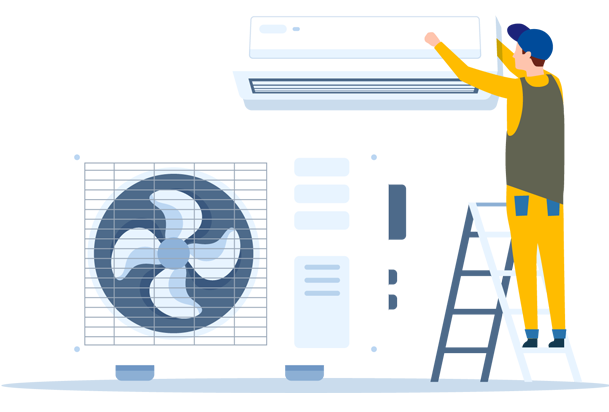In recent years, HVAC asset management has become increasingly important for facility managers in commercial buildings. HVAC systems are a vital component of any building’s infrastructure, providing heating, ventilation, and air conditioning to occupants. The failure of this systems can lead to discomfort, decreased productivity, and even health risks. In addition, inefficient HVAC systems can result in wasted energy and high maintenance costs. To address these challenges, many facility managers are turning to software. In this article, we will discuss the top HVAC asset management software features and benefits in 2023.
HVAC asset management software features and benefits
Real-time monitoring and alerts
One of the most important features of HVAC asset management software is real-time monitoring and alerts. With this feature, facility managers can monitor HVAC equipment in real-time and receive alerts when there are issues. This helps to prevent unexpected equipment downtime and saves energy. By identifying and addressing problems quickly, facility managers can reduce maintenance costs and extend the lifespan of HVAC equipment.
Predictive maintenance by HVAC asset management
Another key feature of this system is predictive maintenance. This feature enables facility managers to identify potential equipment failures before they occur. Predictive maintenance uses data analytics to identify patterns and trends in equipment performance. By identifying potential issues early, facility managers can take proactive measures to prevent equipment failures. This helps to reduce equipment downtime, lower maintenance costs, and extend the lifespan of HVAC equipment.
Energy efficiency
HVAC asset management software provides facility managers with data on HVAC energy consumption. With this data, facility managers can identify areas where energy is being waste and take corrective action to improve efficiency. For example, facility managers can adjust HVAC settings to optimize energy use or replace outdated equipment with more energy-efficient models. By improving energy efficiency, facility managers can save money on energy bills and reduce the environmental impact of HVAC systems.
Asset tracking and management
HVAC asset management software allows facility managers to track and manage HVAC assets, including equipment location, maintenance history, and warranty information. This feature helps to optimize maintenance schedules, reduce equipment downtime, and extend the lifespan of HVAC equipment. By keeping track of equipment performance and maintenance needs, facility managers can make informed decisions about when to repair or replace HVAC equipment.
Mobile access in HVAC asset management
With mobile access to HVAC asset management software, facility managers can monitor and manage HVAC equipment from anywhere, at any time. This feature provides greater flexibility and efficiency for facility managers and ensures that HVAC systems are always functioning optimally. For example, facility managers can use mobile devices to monitor HVAC equipment performance while on the go, or to receive alerts when there are issues.
Reporting and analytics
HVAC asset management software provides facility managers with detailed reports and analytics on HVAC equipment performance, maintenance history, and energy consumption. This data can be used to identify trends, make informe decisions about HVAC maintenance, and optimize energy efficiency. For example, facility managers can use reports to identify equipment that is consuming excessive energy or to track the performance of HVAC upgrades or retrofits.
Integration with other systems
HVAC asset management software can be integrated with other systems, such as building automation systems, to provide a more comprehensive view of HVAC system performance. This feature allows for more effective management of HVAC assets and greater overall efficiency. For example, facility managers can use HVAC asset management software to track equipment performance and energy consumption alongside data from lighting, security, and other building systems.
Also Read, Cleaning Asset Management
At the End of HVAC asset management
In conclusion, HVAC asset management software is an essential tool for facility managers in commercial buildings. With features like real-time monitoring and alerts, predictive maintenance, energy efficiency, asset tracking and management, mobile access, reporting and analytics, and integration with other systems, HVAC asset management software can help facility managers optimize HVAC system performance, reduce downtime and maintenance costs, and extend the lifespan of HVAC equipment. If you’re a facility manager looking to improve HVAC asset management, it’s important to choose a software solution that meets your specific needs. Consider factors such as the size and complexity of your HVAC system, your budget, and the level of support you require.
In addition, be sure to choose a software solution that is user-friendly and easy to navigate. The success of HVAC asset management software relies on the ability of facility managers to use it effectively. Therefore, it’s important to choose a software solution that provides intuitive interfaces, clear reporting, and responsive customer support.
As technology continues to evolve, HVAC asset management software is likely to become even more sophisticated and effective. For example, the use of artificial intelligence and machine learning may help to further improve predictive maintenance capabilities, while the integration of sensor data may enable even more granular monitoring of HVAC system performance.
Ultimately, the benefits of HVAC asset management software are clear. By optimizing HVAC system performance, reducing downtime and maintenance costs, and extending the lifespan of HVAC equipment, facility managers can ensure a comfortable and productive environment for building occupants, while also saving money and reducing environmental impact. If you haven’t already done so, it’s time to explore the benefits of HVAC asset management software for your facility.

